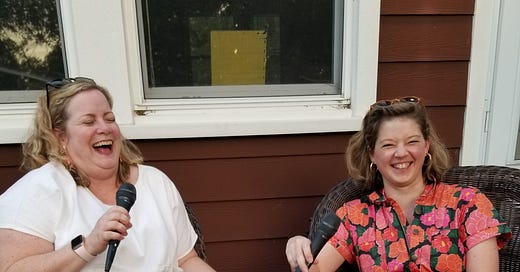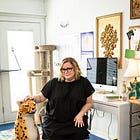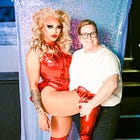How To Interview Someone
I've interviewed folks like John Waters, Trixie Mattel and Sarah Sherman, and here's what I've learned.
In the past few weeks I’ve researched and written out questions for two authors. One was on book tour and I was her conversation partner and one just released her debut memoir and I did a Q&A that will be online soon.
I’m a mix of self-taught and professionally trained. Back in my blogging days, I wrote an interview series called These Are My Bitches, where I interviewed friends about their jobs. I turned that into a podcast called Ladyland, which you can still listen to!
When I started Ladyland, I brought in my friend Mary Katherine to produce it. She was a veteran TV news producer and in addition to producing a tight show, she helped me learn how to interview people. We wrote out questions and recorded practice episodes until I got it right.
Then I started working at an alt-weekly where some of the things I taught myself how to do were gently corrected by co-workers who went to journalism school. Thank you forever to D. Patrick Rodgers and Cole Villena.
If you interview people for your newsletter or podcast, or if you want to start, here is the basic formula for how I do it.
Research
Brain dump
Write questions
Stay present
RESEARCH
I have a few goals when I set out to research someone for an interview: I want to make sure there’s not something big that I don’t know about, I want to see what they get asked all the time and either avoid those questions or ask them in a different way, suss out their general vibe.
If I’m interviewing an author, friend or non-celebrity, I look at their social media, newsletter, I’ll listen to any podcasts they’ve been on, or read any other Q&As they’ve done. If it’s an author I’ll read the book they’re on tour promoting.
For celebrities, I read any recent interviews or profiles. If they’ve been on a popular podcast, I’ll listen to that. If they’re a comedian, I’ll watch their standup. If they’re promoting a TV show, their team will usually send a screener to watch in advance of the interview.
I’m always looking for a way in. For example, I interviewed Margaret Cho in 2023. She had been on Las Culturistas and talked about the Monique quote, “Well, that's what happens when you do clownery. The clown comes back to bite you.” That ended up being my way in. Cho thought it was so funny that I knew that quote and she opened right up. One of my best interviews. (You can read it here.)
BRAIN DUMP
The goal of the brain dump is to make sure all of your questions aren’t about one topic.
While I’m researching, I’ll have a notebook open to a blank page and I’ll write down words, phrases, quotes, anything that’s interesting and may turn into a question. I interview a lot of authors, so I’ll dog ear and asterisk parts of their book as I’m reading and then go back and add what I flagged to my brain dump sheet.
Once I’ve filled up a half or full sheet of paper, I’ll take a new sheet of paper and draw four big boxes. Then I’ll read over my brain dump and figure out four categories, or topics. This could be something like: 1) background, 2) job, 3) book, 4) personal. Then I’ll take everything from my brain dump and re-write it into one of those four boxes.
This helps me create a well-rounded interview. It also shows the person I’m interviewing that I’m prepared and respectful of their time.
WRITE QUESTIONS
At this point, I’ve got a pretty good handle on what I’m going to ask someone. In fact, I typically end up writing questions during the brain dump process, so at this point I’m just narrowing it down. I spend time thinking about how many questions to ask and what order to put the questions in.
I mentioned up top that once I started working at the alt-weekly, I learned I was doing some things wrong. Well, this is where I was doing it a little wrong. I am prone to asking leading questions. For example, I’ll ask, “Did filming that episode make you sad?” The non-leading way to ask that is, “How did it feel to film that episode?” Again, shout-out to people who went to journalism school. I went to music video school.
In the event you’re interviewing a celebrity, I have found that they will usually give you 15 minutes, which in my case equals seven questions. I always include two extra questions in case they go over time or give short answers.
For a 45-minute (ish) interview either for a podcast or an in-person interview, I land somewhere around 15 questions. If it’s an author, this fluctuates depending on if they read at the top or do an audience Q&A.
STAY PRESENT
The goal here is to listen to what they’re saying and ask follow-up questions. I interviewed an author recently whose latest book is set in Shanghai and she lived there for three months while writing it. While answering one of my questions, she mentioned how lonely she was while living there, so instead of moving along to my next question I followed up and asked her what made it so lonely.
This is where I am the weakest. I tend to get nervous and zone out while they’re talking because I’m thinking about my next question or what my face looks like on Zoom. This is very hard to self-correct. Just do your best.
If you’re interested in becoming a good interviewer, read Ari Shapiro’s book The Best Strangers in the World. Listen to podcasts where the host is good at interviewing people. I like Amy Poehler, Elamin Abdelmahmoud and Bowen Yang and Matt Rogers. Read profiles! Michael Schulman at The New Yorker is great. Vulture has great profiles. OMG, watch Hot Ones!
That’s it! Let me know if this helped, or if you have any interview-related questions. I left out a lot about writing and publishing Q&As, but I’m happy to go more into that in a future post if it would help.
Until next time,
Kim
P.S. I know paying $5/mo to read everyone’s newsletter isn’t realistic for a lot of folks (myself included). If you got something out of this newsletter today and want to buy me a coffee, now you can! Either way, thank you for being here.
☕️ 🤑 🫶🏼
It’s impossible to link to every interview I’ve done, but here are two “What I wrote this year” posts that include clickable lists.







Such good tips!!
great advice!